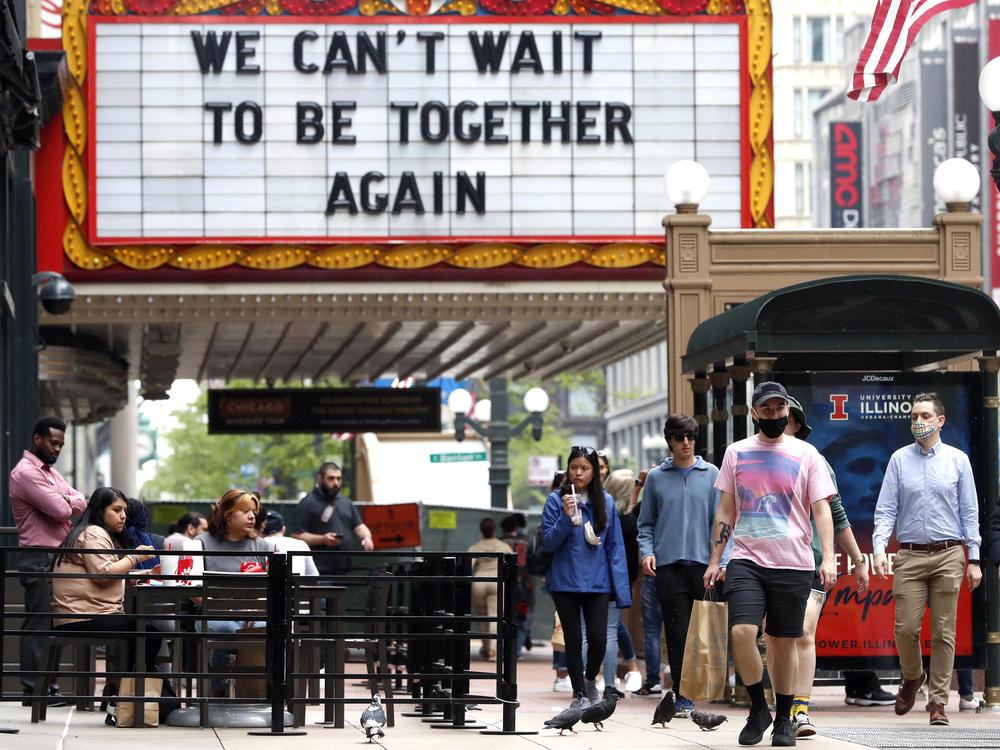Section Branding
Header Content
The CDC Is Gambling On Relaxed Mask Rules To Get More People Vaccinated
Primary Content
When it gave permission to fully vaccinated Americans to shed their masks in many situations, the Centers for Disease Control and Prevention made a tacit gamble: that easing mask rules will inspire more people to get vaccinated against COVID-19.
But that's far from a sure bet, say experts who study human behavior.
"It's a big ol' experiment," says Katherine Milkman of the University of Pennsylvania's Wharton School, an economics professor who studies what inspires behavioral change. Milkman is fully vaccinated but — like many people — has grown accustomed to wearing a mask.
"I feel like, 'Oh, my God, I came outside naked,' if I don't have my mask on," she says. She's guessing plenty of others feel the same way.
"What the CDC is betting on is that people care about their own health and they're going to be nervous" about living in a maskless world if they aren't vaccinated, she says. So Milkman predicts that this will spur more people to get their shots.
During a situation without historical precedent, the CDC's move is a gamble. The risk of loosening mask guidelines, of course, is that unvaccinated people will no longer feel compelled to wear masks at all.
But Milkman says the CDC's guidance puts the incentives and the risks largely on the unvaccinated, which is where it should be. She says that the people most likely to be hurt by the change in rules are "the people who aren't doing the right thing and aren't getting the vaccine."
Syon Bhanot, a behavioral and public economist and assistant professor at Swarthmore College, says he thinks relatively few people will remain ideologically dead set against getting vaccinated. Most of the people hesitant to date about getting the shots, he believes, are ultimately willing, if not exactly eager.
"Part of the early data was people just kind of waiting and seeing" to see how other people reacted to the shot, he says.
But is this latest change in mask guidelines the best incentive for those people? Bhanot says probably not. He says a local bar offering free drinks to those with proof of vaccination is a stronger sell in that it offers people a simpler, clearer way to explain their motive.
" 'Dude, they're giving out free beer' — that's a little bit easier to point to as justification," Bhanot says.
Beer is just one of the many incentives being offered in various vaccination campaigns. Retailers and employers are giving away doughnuts, burgers, cash or paid time off.
Ohio Gov. Mike DeWine even announced a lottery awarding $1 million every week to a vaccinated resident over a five-week period. Since that program was announced last week, the number of Ohioans getting vaccinated increased by about 50% compared with the previous week, though it's not clear how much of that increase was a direct result of the lottery.
But offering rewards alone won't push everyone to get their shot, says Duke University professor Dan Ariely, who studies both economics and psychology. "I think it's going to help the people who are on the fence, but it's not going to be enough," because it still leaves room for people to pretend they're vaccinated, even if they aren't.
Basically, Ariely takes a dimmer view of humankind. He thinks people won't be honest enough to make the new policy work.
"The logic of easing the constraints is predicated on the fact that people will be honest, and if people stop being honest," he says, then infection risks will go up and masks may become a mainstay of life once again.
So it's not sufficient to simply trust people who say they're fully vaccinated; there must be a system that verifies that they are, Ariely says. The fastest path to ending this pandemic is to require and enforce proof of vaccination — as they do in Israel, to board a plane or go into a movie theater, he says.
"It's not that I don't understand that it's a violation of privacy. I would much prefer to have the honor system," he says. "But at the same time, I don't think we're there."
Copyright 2021 NPR. To see more, visit https://www.npr.org.

